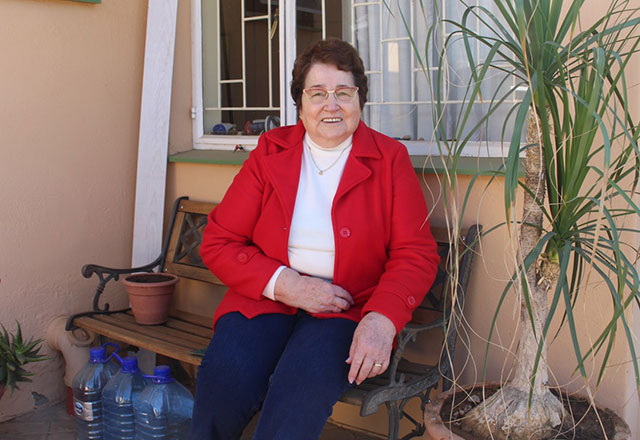OUDE Rust Oord, a retirement home in Windhoek West, has grown from humble beginnings in 1958 where it only had 17 residents, to a robust home accommodating about 150.
The elderly citizens live in three different units at the home.
According to the manager of the home, Schalk van der Merwe, there are 45 elderly persons living in the care unit, 25 accommodated in the assisted living units and the rest all living in the self-catering apartments.
“The care unit is for really frail elderly people who cannot do anything for themselves and need help with everything. The people living in the assisted living unit are still able to perform basic tasks but they need some help. The elderly staying in the self-catering units are fully capable of taking care of themselves,” said van der Merwe.
According to van der Merwe, the home operates off the fees that the elderly people or their families pay for them to stay there.
“We have no subsidy and no financial assistance from the government. Most residents pay the fees by themselves or their children do it and about 95% of the total budget of the old-age home comes from the residents’ pockets,” he said.
Working in elderly care for the past 45 years, Van der Merwe said the only challenge he has faced while working at Oude Rust Oord is the lack of places to care for elderly persons with dementia or Alzheimer’s disease.
“There is only one facility in the whole country which is very small and that one is at Swakopmund,” he said.
He added that laws for taking care of elderly people in Namibia are very limited and this often affects the older people. “The laws that govern elderly care are far behind as we are still working with the 1973 law and because of this there are a lot of elderly people who suffer, especially in the rural areas,” said Van der Merwe.
Van der Merwe noted that although elderly persons are faced with so many challenges, he believes that the government is working hard to address such.
“Namibia is just one of five countries in Africa that has an old-age pension, our government is trying their utmost but there are just too many people,” he said.
A caretaker at the facility, Janet Marley, said that in her 15 years of working at Oude Rust Oord, her worst experience was being insulted by older people when she tries to care for them.
“Some old people are difficult to work with and some will beat and insult us nurses but as you get to know them, they become nicer,” Marley said.
She added that taking care of the patients who suffer from memory loss is always challenging and often times heartbreaking.
“There are days they tell the nurses about accidents that happened to their children that are not true at all but we just have to go along with it to keep them calm. You just have to go along with the story,” she said.
Anna Steyn, a 77-year-old who now lives in the assisted care unit, said her experience at the old-age home has been quite decent.
“I used to be a nurse at Maltahühe hospital for about 20 years and staying in assisted living reminds me of those times. It is nice hearing the natural background sounds of footsteps and people talking, I love it,” said Steyn. She added that when she can, she helps the nurses take care of the other elderly but most of her time is spent reading and creating decorations.
“In my free time, I love to read and as a hobby I enjoy making little flower pots. When another elderly is celebrating their birthday here, I usually make them a little flower for their birthday, give them some sweets and write them a card,” Steyn added.
Speaking to , 86-year-old Kitty Radyn said in her 14 years of living at the home, she has not had a single negative experience.
“For all of my 14 years I have lived in my little house at the self-catering side, I have enjoyed it to this day. I can peacefully nurture my garden outside and spend time with the friends I have made here,” she said.
Her best friend, Elise Roux, said she chose to move into the home because she wanted what was best for her children.
“After losing my husband, I did not want to become a burden to my children. They had their entire lives ahead of them, and I did not want them to be too concerned about me so I chose to come here,” Roux said.
She added that moving into the home was one of the best decisions she has ever made.
“I have made so many friends here and when we get together, we laugh all day and talk about our old days. I feel like I have just started living a completely different life,” Roux said.
The retirement home was founded by the Dutch Reformed Church in 1958.
According to Van der Merwe, in order to get space in the home, one has to apply and be put on the waiting list.
He added that monthly fees at the home can go up to N$12 000.
Stay informed with The Namibian – your source for credible journalism. Get in-depth reporting and opinions for
only N$85 a month. Invest in journalism, invest in democracy –
Subscribe Now!










